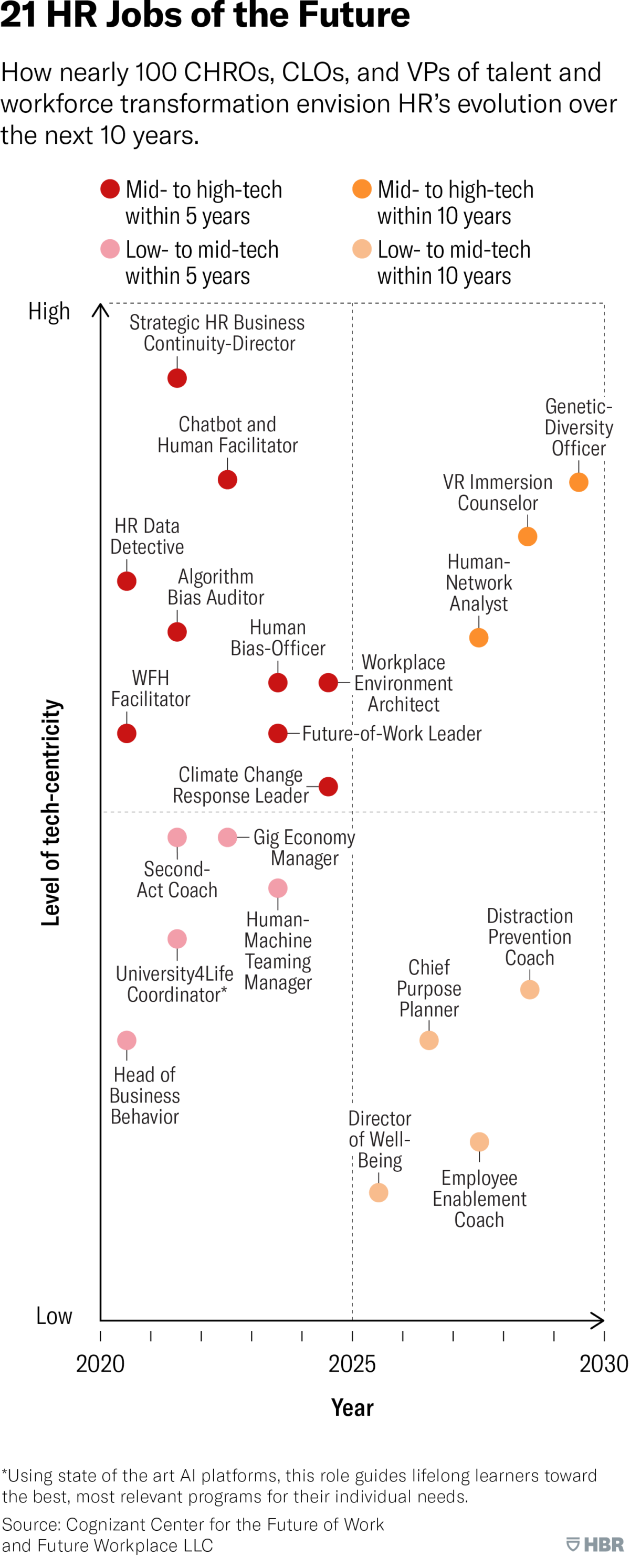
The Future of HR in 21 New Job Positions

The study of the Harvard Business Review on the future of human resources positions after the coronavirus.
The coronavirus has drastically reshaped the economy and the world of work around the world, but not only in the way we work, the places we work and the technologies we use to do so.
This change has brought the role of corporate HR to the forefront according to the Harvard Business Review. Managers and HR managers act as a real guide for workers to navigate their " new normalcy" (at least 73% of cases) and the skills and abilities they will need to succeed over the next decade as new roles continue to emerge. "Just as CFOs have significantly increased their reach since the 2008 financial crisis, so the CHROs now have the same opportunity to become central players in the C-suite.
The Cognizant Center for Future of Work and Future Workplace conducted nine months of research to determine what the future of HR will look like and how HR's role could change over the next 10 years, involving nearly 100 CHROs, CLOs and VPs. This led to a brainstorming process that took into account economic, political, demographic, social, cultural, commercial and technological trends.
More than 60 new future human resources profiles emerged, complete with detailed job descriptions. These profiles were then classified by organizational impact and the list was reduced to 21 future profiles.
The emerging HR profiles have been organized on a 2×2 grid. "The x-axis represents the time and order in which we expect them to appear in the next 10 years, while the y-axis represents the "technological centrality" (i.e., all jobs will use innovative technologies, but only the most techno-centric will require computer training). In addition, each job has been analyzed in the form of a job description (general requirements, specific responsibilities, skills/qualifications, etc.) similar to those that companies will have to write in the next decade to recruit candidates".

Some of the roles identified are completely new positions, others are emerging right now, due to the needs brought by the pandemic. In fact, 2020 is and will be a time of reset for Human Resources, in which to rethink and restart the strategy in light of the context. Finally, some of these positions, still "theoretical" today, will be reflected in reality in the coming months and years thanks to visionary leaders.
Individual and organizational well-being
Distance working has led to a growth of the digital economy, of the "always on" culture and of the stress due to work/life balance management. These challenges have placed new emphasis on the importance of workers' health and well-being - and not just in terms of physical health. Note that even before the virus, Gallup reported that two-thirds of full-time workers experienced Burnout incidents.
The future role that opens up among HR professionals is that of the Director of Wellness: a professional who is concerned with developing a greater focus and a more holistic view of employee well-being that includes workers' emotional, mental and spiritual health along with physical health. Focusing the company's strategy on employee well-being means increasing employee retention, improving productivity and reducing turnover. According to the firm, this role has already begun to take hold and the next 10 years will see this position grow and settle.
"Today, with over 88% of workers working remotely, this role should work across the board to ensure that employees outside the office receive the same benefits as those working locally. This is where we see a home office facilitator come into play to make sure that the organization's processes, policies and technologies are optimal for remote workers. A key parameter for the success of this role would be to build a strong sense of ownership among remote workers within the organization, ensuring that they know their purpose and feel deeply cared for.
Trust and Security of the Organization
Human resources professionals are the guardians and models of an ethical and responsible workplace. As organizations are investing in digital transformation initiatives and establishing a "data culture", the responsibilities of supporting it on the part of the HR department will increase.
A joint research conducted by Oracle and Future Workplace on attitudes toward IA in the workplace found that many people were concerned about data security breaches: Of the 8,370 HR managers, hiring managers and workers surveyed in ten countries, 71 percent were "sometimes concerned" and 38 percent said they were "very concerned" about data breaches. In fact, 80 percent of respondents said their company should seek permission before using IA to collect data on them.
On the other hand, a survey by LinkedIn found that 67% of recruitment managers said that IA saves time in the early stages of selection. As a result, a question arises about the technology and its potential for distortion, inaccuracy and lack of transparency and privacy (even on social media).
In this era of algorithms has emerged the need for more "human" systems in the data evaluation circuit to ensure fairness, explicability and accountability among HR. An example of repercussion on future roles? The Human Bias Officer is responsible for helping to mitigate prejudice; it would ensure that people are treated fairly throughout the entire period of their employment, from recruitment to exit, regardless of race, ethnicity, gender, sexual orientation, religion, economic status, origin, age or culture.
Another new role to ensure employee safety is that of Strategic HR Business Continuity Director. This person leads the HR team and works with the CEO, CFO, CIO and Facilities Director to create a safe workplace - for both on-site and remote workers.
"Elizabeth Adefioye, Senior Vice President and CHRO at Ingredion, has incorporated emergency preparedness and business continuity into her role as senior HR. Says Adefioye: "Since the Covid-19 pandemic, I have worked with our CEO and senior managers in the technology, finance, communications and facilities departments to develop a gradual and safe global approach to return to work. According to SHRM research, this was and is a key objective for CHRO, as 34% of organizations did not have an emergency preparedness plan before the Covid-19 pandemic."
Creativity and innovation
While looking for new ways to grow organizations in the midst of rapid change, a new role must emerge that intersects business strategy and HR. The Work Leader would be responsible for analyzing the most essential skills as the workforce evolves. This role would address both the definition of the organization's strategy for the future of work and the proposal of retraining and upskilling efforts for current employees. The position would also summarize input from academia, industry associations and competitive threats in the marketplace to imagine new roles and skills for the continued success of the organization.
In addition, as part of the meetings and training will continue to be virtual, another future role is that of the VR Immersion Counselor: a professional who helps to scale training programs for a variety of use cases, including onboarding, coaching, retraining, upskilling and even medical and security training.
"H&R Block is an example of a company that has already used virtual reality simulations to train customer service representatives to reduce customer interactions. Exercising to answer difficult customer questions in a virtual reality simulation, the company has seen a 50% decrease in dissatisfied customers, with 70% of customer service representatives preferring to train with virtual reality simulations over traditional forms of learning. In the same way, the ABI research forecasts that the VR training market will reach 6.3 billion dollars by 2022".
Data literacy
To date, few HR functions are building data analysis capabilities within the team to improve employee performance. In the future, the tendency of HR to follow the data-driven example of other departments, such as customer experience and finance, will increase.
At a time of transition, the new role of HR Data Detective could contribute to this. Being responsible for synthesizing disparate data streams (such as employee surveys, learning management systems and benefit portals) could help resolve business critical issues. a professional with analysis and synthesis skills who would gather human resource information to help improve employee performance and business outcomes.
Companies that have already begun to build this type of data literacy in their business functions will have a competitive advantage. Chase Rowbotham, head of People Analytics at Genentech, says: "As distance working becomes the new norm, we are able to gather information from our HR information systems to develop a range of new HR practices, such as training remote worker managers on successful strategies to lead a global remote team to ensure both productivity and ongoing employee engagement.
Man-machine partnership
With the increasing use of robots in companies, the need for man-machine collaboration has become evident. Robots are very reliable in the tasks of calculation, analysis and model recognition, but human beings' own judgment is not their field: they are not able to ask themselves questions about the most appropriate action to be taken on the basis of all available data. On the other hand, human beings are very good at evaluating situations (they have the "art" of work, while robots have the "science of work"). This complementarity will probably lead to the creation of new HR roles focused on the integration and cooperation of man-machine work, such as the Human-Machine Teaming Manager.
"For example, James Loo, Head of Human Resources at DBS Bank (Taiwan) sees a possible new job role, ChatBot Coach, responsible for creating a seamless application experience. According to Loo, "A Chatbot Coach would work with the DBS Bank recruiting team to train the chatbot to handle routine candidate screening tasks and answer candidates' frequently asked questions, while human recruiters have more time to focus on strategic areas such as engaging with hiring managers to better understand the need for a new role and the changing needs of the business for new hires.
Harvard points out that many of these new roles would create new and diverse jobs in the future of HR. For example, a Human-Machine Teaming Manager may find himself working with a Chatbot Coach to enhance the experience of a candidate with artificial intelligence. These roles could also influence HR career paths. Someone with several years of experience as an HR Data Detective may be an ideal candidate for the role of Head of Business Behavior, another new job in future HR.
Change is imminent and HR departments would do well to keep up with it strategically. "If we look back to the recent past, we see how new positions have been created in HR, including the role of Financial Wellness Manager, which has now been widely adopted. In fact, a survey published by the Employee Benefit Research Institute shows that about half of companies with more than 500 employees now offer a financial wellness program; 20% are actively implementing these programs for their employees today, and a further 29% are interested in implementing them in the future.
Another HR position created in recent years is the Global Head of Employee Experience. "This role is best exemplified by Airbnb's Chief People Officer, who revisited the role by bringing together disparate people, technologies and real estate functions to create a consumer-class employee experience. As of June 2020, organizations such as ABN-AMRO, ING, IBM, HPE, Novartis and Walmart have staff professionals with this title.
Translated with www.DeepL.com/Translator
Did you like this article? Sign up for the newsletter and receive weekly news!
Subscribe to NewsletterComments:
No comments are in yet. You be the first to comment on this article!